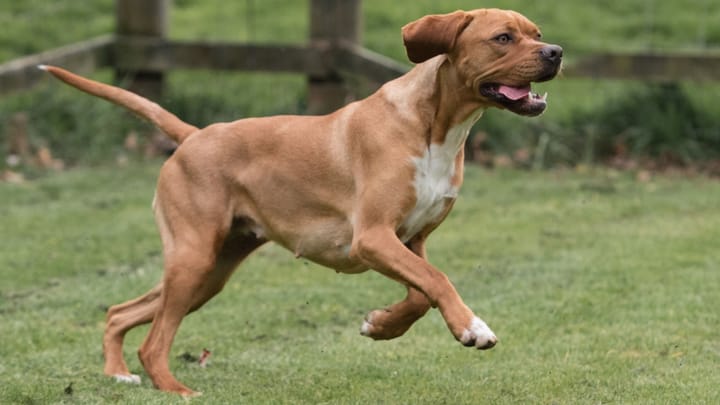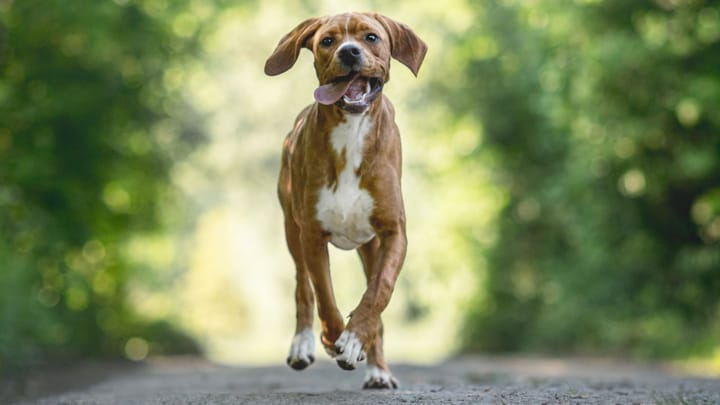Portuguese Pointing Dog
Other name: Perdigueiro Português


The Portuguese Pointer is considered to be the ultimate gun dog. An athletic animal with a combination of speed, strength, and stamina, the Portuguese Pointer is a highly prized hunting companion. Experts believe it’s a direct descendent of an ancient Iberian Hunting dog from the 12th Century. As well as being an excellent retriever, this breed can make a great family pet. They’re affectionate, playful, and have an instinctual desire to please their favourite humans.
|
Life expectancy |
The Portuguese Pointing Dog has a life expectancy of between 12 and 14 years |
|
Temperament |
|
|
Size |
Medium
|
|
Adult size |
Female
Between 19 and 22 in
Male
Between 20 and 24 in
|
|
Adult weight |
Female
Between 35 and 49 lb
Male
Between 44 and 60 lb
|
|
Coat colour
Light-brown, sometimes with white markings. |
Sand |
|
Type of coat
Very short and coarse. Tight to the body. |
Short Hard |
|
Eye colour
Light brown. |
Brown
|
|
Purchase price |
The Portuguese Pointing Dog costs between £800 and £1000 |
These dogs love being outside. They love running through fields and forests. Not suited to inner-city life. They require lots of attention and even more affection. Can be quite “needy.” Needs a committed owner with lots of free time.
More details about the Portuguese Pointing Dog
Portuguese Pointing Dog: Origins and history
Bred from ancient Iberian hunting dogs, the Portuguese Pointer became very popular during the 18th century. While the ruling nobility preferred more fashionable hunting breeds, many ”commoners” saw the potential of this under-appreciated gun dog. During this time, English wine merchants moved into the Oporto region of Northern Portugal. They also spotted the dog’s excellent tracking skill and began exporting the breed to the UK. Unfortunately, like many hunting breeds, its numbers diminished during the first half of the 20th century. New technologies and wide-spread industrialisation made many of these dogs redundant, pushing them to the brink of extinction. However, a group of diligent dog lovers rounded up the surviving dogs and established breeding clubs in the UK and Northern Portugal. Although still rare, the breed’s numbers are slowly rising.
Physical characteristics of the Portuguese Pointing Dog
Medium sized dog. A well-built animal with an elegant and proud posture. Long, muscular neck and a high head carriage. Short, compact muzzle. An endearing and quizzical expression.
FCI classification of the Portuguese Pointing Dog
-
Group 7 - Pointing Dogs
-
Section 1 : Continental Pointing Dogs
Portuguese Pointing Dog: Characteristics
Portuguese Pointing Dog: Behaviour
Training a Portuguese Pointing Dog
Very easy to train, even for an inexperienced owner. Just stick to the basics - reward based training that includes lots of treats and praise.
Portuguese Pointing Dog: Lifestyle
Breed compatibility Portuguese Pointing Dog
Portuguese Pointing Dog: Grooming
A tight, short coat. Very easy to maintain. A weekly brush is enough. However, like the majority of Gun dogs, the Portuguese Pointer is prone to ear infections. You’ll need to clean their ears once a month.
Portuguese Pointing Dog: Health
A very healthy and well-bred dog. Their average life expectancy is between 12 and 14 years.
A strong and robust dog. Well built and comfortable working in rugged, outdoor environments.
No issues when its comes to dealing with heat. Has a short, tight coat. Very low risk of overheating.
Will definitely struggle during the winter, especially during the coldest months. Not built for the freezing temperatures.
An active dog that tends to stay fit and lean. Any weight gain will be related to overfeeding or an underlying health problem.
- Ear infections
- Dental infections
- Hip dysplasia
Do you want a Portuguese Pointing Dog dog ?
Oh no...
There are no Portuguese Pointing Dog adoption profiles at the moment...



